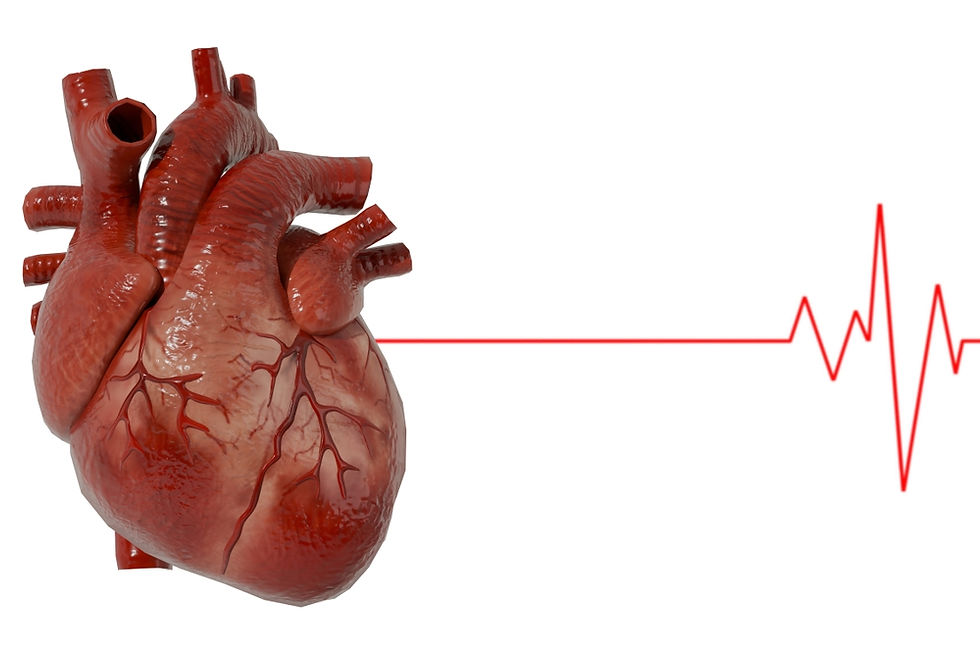5-Min Science: HRV Biofeedback: How and Why Does it Work?
- BioSource Faculty
- Dec 23, 2024
- 3 min read
Updated: Dec 25, 2024

Google Illuminate discussion of Lehrer and Gevirtz's classic "Heart Rate Variability Biofeedback: How and Why Does it Work?," published in the 2014 Frontiers in Psychology.
HRV Biofeedback Transcript
Host: Ever heard of biofeedback? It sounds a bit sci-fi, doesn't it?
Guest: It is pretty cool. Like training your body to do things you didn't even know it could.
Host: Exactly! And today we're focusing on a specific type—heart rate variability biofeedback. This paper explores how it works.
Guest: It's all about harnessing the power of your own heartbeat to improve your health and well-being.
Host: Sounds amazing! So, let's dive in. The paper starts by saying that heart rate variability biofeedback, HRVB, is showing promise for treating all sorts of things, right?
Guest: Yeah, from asthma to depression. It's pretty broad. The key is learning to control the variations in your heart rate.
Host: And that's what makes the "why" so interesting, isn't it? How does it actually work? The paper talks about how HRVB creates these huge changes in heart rate patterns. It's not just random, though, is it?
Guest: No, it's a complex interplay of things. It involves the way your heart rate interacts with your breathing, your blood pressure, and your baroreflex.
Host: So it's not just about slowing your breathing down, right? The paper mentions phase relationships between heart rate and breathing. What's that all about?
Guest: It's about the timing. Ideally, your heart rate increases at the start of your inhale and decreases at the start of your exhale. That's the most efficient pattern for gas exchange.
Host: So, like, perfectly synchronized?
Guest: Exactly. HRVB helps you achieve that synchronization.
Host: And then there's the baroreflex. That's the body's natural blood pressure regulator, right?
Guest: Yep. It's a feedback loop. When your blood pressure rises, your heart rate slows down, and vice versa. HRVB strengthens this reflex.
Host: So it's like giving your body's natural control system a workout?
Guest: Precisely. And that improved regulation can have a cascade of positive effects.
Host: The paper links higher HRV to better resilience, both physically and emotionally. Makes sense, right?
Guest: Absolutely. A more adaptable system is a more resilient system. It can handle stress better.
Host: So, people with lower HRV tend to be more susceptible to illness and emotional problems?
Guest: Studies suggest that's the case. Yeah.
Host: The concept of resonance is fascinating. It's like finding the sweet spot in your body's rhythm, isn't it?
Guest: Exactly. There's a specific frequency where your cardiovascular system responds most strongly. It's usually around 0.1 Hz.
Host: And HRVB helps you tap into that resonant frequency?
Guest: Yes, to maximize the effect of the biofeedback.
Host: The paper also mentions the vagal afferent pathway. That's the connection between your heart and your brain, right?
Guest: Yes, it's a communication line. HRVB might be stimulating this pathway, which could explain its effects on mood and anxiety.
Host: So it's not just about physical regulation, but also mental well-being?
Guest: Precisely. It's a mind-body connection.
Host: The paper mentions HEPs. What are those?
Guest: They're a way to measure the brain's response to your heartbeat. Studies show that HRVB training increases the HEP signal, suggesting increased vagal afferent activity.
Host: So it's like a direct measure of the brain-heart connection being strengthened?
Guest: Exactly.
Host: Beyond the main mechanisms, the paper suggests other possibilities, like improved gas exchange and anti-inflammatory effects.
Guest: It's likely a combination of factors. The effects are multifaceted.
Host: So it's not a one-size-fits-all explanation. To sum it up, HRVB seems to work by strengthening the baroreflex, improving the brain-heart connection, and potentially through other mechanisms.
Guest: It's a powerful technique with a lot of potential. More research is needed, but the early findings are very promising.
Host: It's amazing how much we can learn about our bodies and how to optimize their function.
Guest: It highlights the interconnectedness of our physical and mental states.
Host: And the potential for self-regulation. This discussion has been really eye-opening.
Guest: It's a field with a lot of potential.
Host: That was a great discussion! Thanks for sharing your insights.
Support Our Friends







Comments